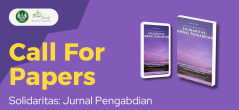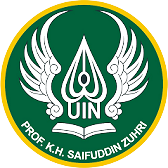Habituasi Gerakan Maghrib Mengaji Pada Masyarakat Desa Pakkabba Kabupaten Takalar
DOI:
https://doi.org/10.24090/sjp.v1i2.5901Keywords:
Habituation, Maghrib Mengaji, Al-Qur’an, MuslimsAbstract
The Mahgrib Mengaji program was launched by the Ministry of Religion of the Republic of Indonesia on April 14, 2013. The program gets attention and good response from local governments in various regions of the Republic of Indonesia and continues today, including in the Takalar District. Along with the rate of development of technology, information, and communication, the community began to leave the Maghrib Mengaji program, including in Pakkabba Village, because the younger generation of the community put more engagement to social media and television shows. This community service activity aims to provide a deep understanding of the implementation of the Maghrib Mengaji program and create awareness of reading and practicing the contentsof the Quran. The community service team provides socialization and assistance to the Pakkabba Village community to habituate the Maghrib Mengaji program. Service activities are carried out by socializing the importance of reading the Quran and assisting Maghrib Mengaji habituation activities carried out from the house to house. Community service activities are carried out with socialization and assistance with the following stages: planning, implementation, monitoring, and administration. The activity results show that the people of Pakkabba Village have high enthusiasm for implementing the Maghrib Mengaji Program and getting support from the government and community leaders. Service activities received approval and support from the community, including the government and local community leaders.References
Arsam, A. (2014). Dialog Interaktif Sebagai Upaya Evaluasi Dakwah. Addin, 8(2), 54760.
Jhingan, M. L. (2016). Ekonomi Pembangunan Dan Perencanaan. Rajawali Pers.
Junaedi, M. (2017). Paradigma Baru Filsafat Pendidikan Islam. Kencana.
Kartika, R., & Nurman, N. (2018). Pelaksanaan Gerakan Masyarakat Magrib Mengaji Di Nagari Lubuk Basung Kabupaten Agam. Journal of Civic Education, 1(2), 141–148.
Muvid, M. B. (2019). Tipologi Aliran-Aliran Tasawuf. BILDUNG.
Natasha, H. (2012). Revitalisasi Lembaga Pendidikan dalam Upaya Membangun Karakter Bangsa. An-Nida’, 37(1), 89–94.
Prayugo, B. (2020). Pola Komunikasi Masjid Dalam Menanamkan Nilai Islami Kepada Anak Melalui Program Maghrib Mengaji Perspektif Komunikasi Antar Pribadi (Studi Deskriptif Masjid Kelurahan Harjosari I Kecamatan Medan Amplas). Jurnal Komunika Islamika: Jurnal Ilmu Komunikasi Dan Kajian Islam, 6(2), 168–176.
Suneki, S. (2012). Dampak Globalisasi Terhadap Eksistensi Budaya Daerah. CIVIS, 2(1).
Umar, N. (2021a). Jihad Melawan Religious Hate Speech. Elex Media Komputindo.
Umar, N. (2021b). Memahami Al-Quran Di Masa Post-Truth. Grasindo.
Widyaningsih, R., Kuntarto, & Chamadi, M. R. (2019). Edukasi Deteksi Dini Radikalisme Bagi Santri Di Pesantren
Darul Abror Purwokerto. Dinamika Journal, 1(3), 28–36.
Widyaningsih, R., Kuntarto, & Chamadi, M.R. (2021). The International Journal of Social Sciences The Hoax of SARA (
Tribe , Religion , Race , and Intergroup ) as a Threat to the Ideology of Pancasila
Resilience. Jurnal Ilmiah Peuradeun, 9(2),413–434. https://doi.org/10.26811/peuradeun.v9i2
Jhingan, M. L. (2016). Ekonomi Pembangunan Dan Perencanaan. Rajawali Pers.
Junaedi, M. (2017). Paradigma Baru Filsafat Pendidikan Islam. Kencana.
Kartika, R., & Nurman, N. (2018). Pelaksanaan Gerakan Masyarakat Magrib Mengaji Di Nagari Lubuk Basung Kabupaten Agam. Journal of Civic Education, 1(2), 141–148.
Muvid, M. B. (2019). Tipologi Aliran-Aliran Tasawuf. BILDUNG.
Natasha, H. (2012). Revitalisasi Lembaga Pendidikan dalam Upaya Membangun Karakter Bangsa. An-Nida’, 37(1), 89–94.
Prayugo, B. (2020). Pola Komunikasi Masjid Dalam Menanamkan Nilai Islami Kepada Anak Melalui Program Maghrib Mengaji Perspektif Komunikasi Antar Pribadi (Studi Deskriptif Masjid Kelurahan Harjosari I Kecamatan Medan Amplas). Jurnal Komunika Islamika: Jurnal Ilmu Komunikasi Dan Kajian Islam, 6(2), 168–176.
Suneki, S. (2012). Dampak Globalisasi Terhadap Eksistensi Budaya Daerah. CIVIS, 2(1).
Umar, N. (2021a). Jihad Melawan Religious Hate Speech. Elex Media Komputindo.
Umar, N. (2021b). Memahami Al-Quran Di Masa Post-Truth. Grasindo.
Widyaningsih, R., Kuntarto, & Chamadi, M. R. (2019). Edukasi Deteksi Dini Radikalisme Bagi Santri Di Pesantren
Darul Abror Purwokerto. Dinamika Journal, 1(3), 28–36.
Widyaningsih, R., Kuntarto, & Chamadi, M.R. (2021). The International Journal of Social Sciences The Hoax of SARA (
Tribe , Religion , Race , and Intergroup ) as a Threat to the Ideology of Pancasila
Resilience. Jurnal Ilmiah Peuradeun, 9(2),413–434. https://doi.org/10.26811/peuradeun.v9i2
Downloads
Published
2022-01-01
How to Cite
Rahman, A. (2022). Habituasi Gerakan Maghrib Mengaji Pada Masyarakat Desa Pakkabba Kabupaten Takalar. Solidaritas: Jurnal Pengabdian, 1(2), 23–43. https://doi.org/10.24090/sjp.v1i2.5901
Issue
Section
Articles
License
Copyright (c) 2022 Abdul Rahman

This work is licensed under a Creative Commons Attribution-ShareAlike 4.0 International License.
Authors who publish with this journal agree to the following terms:
- Authors retain copyright and grant the journal right of first publication with the work simultaneously licensed under a Creative Commons Attribution-ShareAlike International License that allows others to share the work with an acknowledgement of the work's authorship and initial publication in this journal.
- Authors are able to enter into separate, additional contractual arrangements for the non-exclusive distribution of the journal's published version of the work (e.g., post it to an institutional repository or publish it in a book), with an acknowledgement of its initial publication in this journal.
- Authors are permitted and encouraged to post their work online (e.g., in institutional repositories or on their website) prior to and during the submission process, as it can lead to productive exchanges, as well as earlier and greater citation of published work (See The Effect of Open Access).










